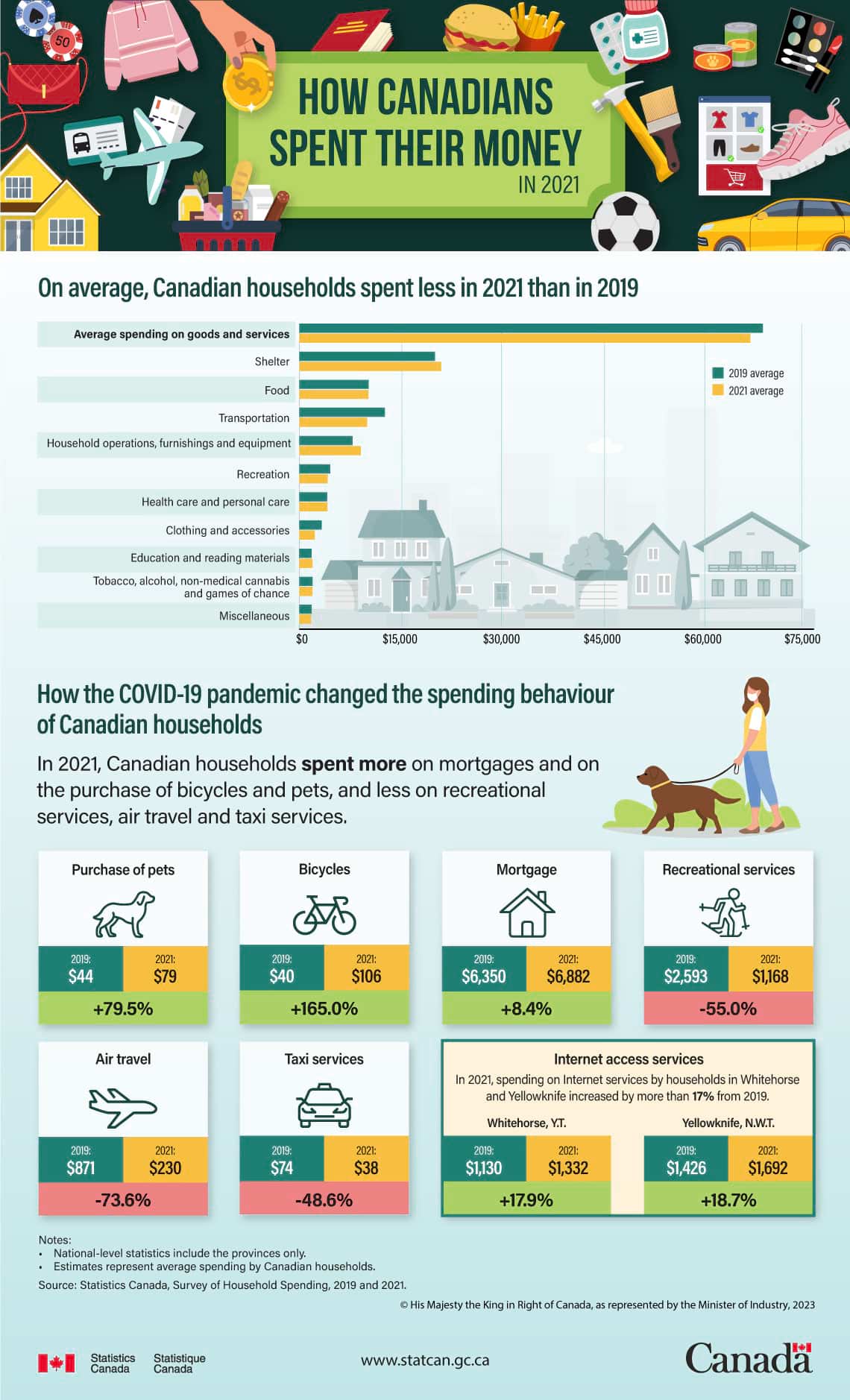Immigration
How do people in Canada spend their money?

Newcomers may find this information particularly useful as they estimate their expenses when settling in Canada. (File Photo: Toa Heftiba/Unsplash)
Statistics Canada recently released its survey on household spending—the annual report on how much Canadian households spend on goods and services in the country—for the year 2021.
The report provides a view of what households in Canada were spending their money on, and how much of their income was spent on allocated to each spending category. Newcomers may find this information particularly useful as they estimate their expenses when settling in Canada.
In 2021, Canadian households spent an average of $67,126 on goods and services, marking a 2.7% reduction in expenditure from 2019. This represents the first downturn in household spending of goods and services since 2010. After accounting for a consumer inflation rate of 4.1% spanning from 2019 to 2021, the genuine contraction in average annual household expenditure stands at 6.5%–representing an overall decline in average spending of Canadian households.
Contraction induced by the COVID-19 pandemic was observed across numerous spending categories in Canadian households, leading to an overall reduction in the consumption of goods and services from 2019 to 2021. It should be noted that many of the results from this study will therefore be skewed in specific directions (like spending on transportation for example), which may have since normalised.
Consistent with other years, however, in 2021, the top three expenditure categories continued to be housing (31.4%), food (15.4%), and transport (15.0%).
Read on to learn more about how Canadians spent their money in 2021, and what you can expect in the future. All monetary figures are given in current Canadian dollars (not adjusted for inflation).

Housing
On average, Canadian families spent $21,106 on housing in 2021, showing a 4.5% increase from 2019. This rise in spending can be attributed to increased shelter (rent and homeownership) costs for both mortgaged homeowners and renters.
On average, renters paid $15,256 for accommodation in 2021, a rise of 5.9%. Rent made up most of this overall expense, with the average rent payment standing at $13,060, a 6.8% increase from 2019.
Average shelter costs for renters was $15,256 in 2021, an increase of 5.9% from 2019. Of these expenses, $13,060 was directed towards rent, a rise of 6.8% compared to 2019.
Similarly, homeowners with a mortgage in 2021 spent an average of $33,118 on housing, indicating a 7.8% increase from 2019. More than half of this amount was dedicated to mortgage payments, which rose by 9.1% from 2019.
There were associated housing costs, like communications/entertainment (internet connection, phone service, electronic entertainment devices, etc.) systems that the study also covered. Spending on communication increased in 2021, to an average of $3,001 per household, representing a 12.4% rise from 2019. This hike was propelled by increased spending on:
- telephones and equipment which saw a leap of 114.1%;
- internet services which rose by 21.7%;
- digital services with an increase of 30.5%; and
- postal, courier, delivery, and other communication services which rose 68.7%.
Transportation
In 2021, the average transportation cost for Canadian households was $10,099, reflecting a 20.7% decrease in total category expenditure compared to 2019. Out of the total amount, private transportation (taxi, uber, etc.) expenses amounted to $9,501.
The average expenditure on the acquisition of automobiles, vans, and trucks was $4,083 in 2021, a rate that is 16.7% less than 2019. Aligned with the average gasoline price surging by 12.8% from 2019 to 2021, the average expenditure on gasoline and other types of fuel ($2,080) saw a decline of 14.1%.
Lastly, expenditure on public transport also declined with the average Canadian household spending $598 in 2021, down more than 50% from 2019.
Recreational services and food from restaurants
In 2021, the average household spend on recreation was $4,223, reflecting a decrease of 8.7% from 2019—mainly due to a drop in expenses towards recreational services like movie theatres, sporting and performing arts events, and package trips by a significant 55.0%.
Impacted by the pandemic in 2021, numerous restaurants turned to delivery, takeout services, or had to operate at less than full capacity, which explains the reduced average household expenditure on food from restaurants ($2,189), down by 21.1% compared to 2019. A reversal was seen in spending on store-purchased food which rose to $8,065, or 7.0% in 2021.
Provincial variations in spending
In 2021, households in British Columbia and Alberta reported the highest average expenditure on goods and services, at $75,028 and $75,003 respectively. Conversely, New Brunswick and Quebec reported the lowest average spending, at $57,582 and $57,889 respectively.
Shelter
British Columbia and Ontario observed the highest average housing expenditure, totalling $24,594 and $24,101 respectively.
In contrast, the lowest spending on shelter was observed in New Brunswick and Newfoundland and Labrador, amounting to $14,685 and $14,736 respectively. Out of their total consumption, Ontario households allocated the highest percentage of their income (34.6%) to housing, whereas Newfoundland and Labrador households allocated the lowest (24.4%).
Between 2019 and 2021, the most significant increase in average housing expenditure was recorded in Prince Edward Island, with a rise of 10.7%, followed by Ontario, which noted a 7.8% increase.
Transportation
In 2021, Manitoba and Alberta households had the largest average transportation expenditures among the provinces, reporting spending figures of $11,230 and $11,066 respectively. Conversely, Quebec households reported the smallest figure at $9,409. The primary reason for this was the notable spending on private transportation by Manitoba and Alberta, with expenditures of $10,798 and $10,438 respectively, versus Quebec’s expenditure of $8,979.
With respect to public transportation, British Columbia and Ontario households reported the largest average expenditures, at $751 and $724 respectively. On the other hand, New Brunswick tallied the smallest average expenditure on public transport, at $277.
How might this have changed?
As noted, the COVID-19 pandemic had a significant impact on the results of this study—resulting in likely changes that we could see in future Canadian spending.
For example, transportation expenditure was notably reduced in 2021, due not just to a volatile car market, but also to lockdowns that were partially in effect throughout Canada. While the average price of used cars in Canada has continued to increase (and supply issues continue to plague the car industry as a whole)—largely supporting decreased expenditure—spending on public transport is likely to see a rebound, with the lifting of lockdowns and returns en masse to workplaces.Rising gasoline prices will likely also contribute to increased expenditure in the future.
For similar reasons, one could expect the average expenditure on recreational services to increase, as retail and tourism—two sectors with pronounced labour shortages throughout the pandemic, and after—rebound modestly in hiring, as Canadians return to brick-and-mortar stores.
One category of expenses that has only increased from 2021, however, is shelter. Much has been made of Canada’s rising housing costs, and data from Statistics Canada reveals that the continued rise in housing costs (led by rent prices) has occurred at the fastest pace in three decades. It is likely that these costs will continue to increase moderately, as higher interest rates also impact homeowners with a mortgage, in-turn cutting supply and increasing the demand for rent.





















